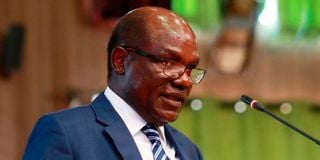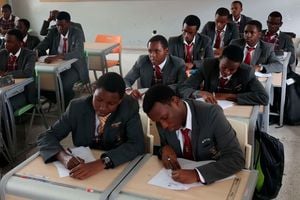IEBC to deploy over 500,000 workers in massive exercise

IEBC Chairman Wafula Chebukati
The electoral agency will deploy more than 500,000 personnel to run the August 9 General Election in what will be one of Kenya’s biggest undertakings since the re-introduction of multi-party politics in 1992.
The Independent Electoral and Boundaries Commission (IEBC) will deploy a total of 323,603 polling clerks, who will be tasked with the counting of votes in the high-stakes election that has attracted 16,098 candidates.
Another 92,458 presiding officers and deputy presiding officers will also be deployed across the country as well as 94 county returning officers and deputy county returning officers, 580 constituency returning officers and deputy constituency returning officers, 290 ICT clerks, 290 logistics officers in addition to the 5,827 support electoral trainers (SETs).
The IEBC has deployed its permanent staff as returning officers in each of the 47 counties and 290 constituencies.
180,000 police officers
The figures do not include police officers who are usually hired on a temporary basis to provide security at the polling stations, 290 constituencies and 47 county tallying centres as well as the presidential tallying centre at the Bomas of Kenya.
In 2017, IEBC recruited 180,000 police officers to provide security at 40,883 polling stations then.
The polling stations have since increased to 46,233, and the number of police officers who will be deployed will likely increase by the same number.
This would bring the total number of IEBC staff in next month’s polls close to 600,000 personnel.
During the National Election Conference held in Nairobi last week, Mr Chebukati called for maximum support to the election officials and requested the Director of Criminal Investigations (DCI) to remain vigilant against any form of intimidation of the staff.
“The commission requests that the poll officials be accorded all the support they need and condemns the ethnic profiling of returning officers and their officers that is not only designed to intimidate them but may also incite members of the public to cause them harm,” Mr Chebukati said.
During a joint TV interview on Wednesday last week, Mr Chebukati urged politicians to refrain from what he termed as “ethnic profiling of IEBC staff”.
He mentioned the killing of former IEBC head of ICT Chris Msando barely a week (July 28, 2017) to the August 8, 2017 polls, adding that his team now seems ‘frightened’.
“Seeing their images in the media and on social media has made our staff members, especially those in the ICT division, fearful. If you recall, one of our employees from the ICT department was murdered around this time five years ago. When members of the commission and staff are being profiled, it becomes a very frightening time,” Mr Chebukati said.
This election has been described as highly competitive, bringing forth 16,098 candidates – with four gunning for the presidency.
These are Deputy President William Ruto of the Kenya Kwanza Alliance, Azimio la Umoja-One Kenya Coalition flag bearer Raila Odinga, Roots Party of Kenya led by Mr George Wajackoyah and Agano Party candidate David Mwaure Waihiga.
Among the candidates are 2,132 eyeing the 290 parliamentary slots and 340 and 266 seeking the 47 Senate and 47 governor seats, respectively.
Another 12, 994 candidates are gunning for the 1,450 Member of County Assembly (MCA) positions.
IEBC has already assured the candidates that it will deploy satellite modems to at least 1,111 polling stations with no 3G network accessibility to enhance transparency.
IEBC Chief Executive Officer Marjan Hussein Marjan announced that each of the 1,450 electoral wards in the country will have a backup of six Kenya Integrated Electoral Management System (Kiems) kits just in case some fail to work.
“It is going to be better this time than it was in 2017. We will take the necessary steps to ensure that everything goes well,” said Mr Marjan during the election conference last week.
Kiems kits work offline and the CEO noted that the backup Kiems kits will be tested before they are deployed.
Other than their inbuilt battery that lasts up to eight hours, they will also have power banks, a backup of power supply that lasts up to 12 to 13 hours, enough to oversee the duration of the voting process to the transmission of election results.
The commission is also planning to deploy solar lamps as backup in tallying centres just in case the electricity goes off and also in areas that are yet to be connected to the electricity grid.
During the conference, KICTANet chief executive Grace Githaiga noted that the coming into force of the Data Protection Act will ensure that servers housing the voter register are hosted locally to address the apprehension in this high-stake polls.
“The law says that if it has to be hosted out of the country’s territory then it has to be with the approval of the Data Protection Commissioner,” said Ms Githaiga.
In the 2017 General Election, the IEBC said that the servers housing the voter register were hosted in France.
By that time, the Data Protection Act had not been enacted.
IN NUMBERS:
• 323, 603: Number of polling clerks
• 92,458: Number of presiding officers and deputy presiding officers
• 22,120,458: Total number of registered voters
• 46,233: Total number of polling stations
• 16,098: Total number of candidates
• 4: Total number of presidential candidates
• 8,700: Total number of backup Kiems kits, six for each of 1,450 wards





